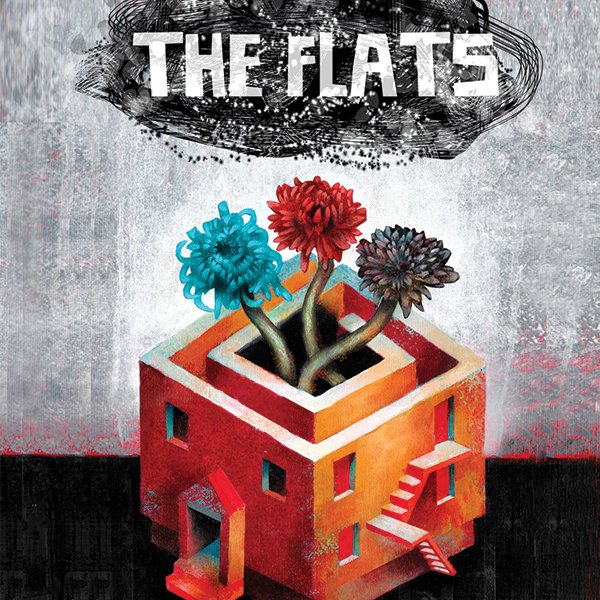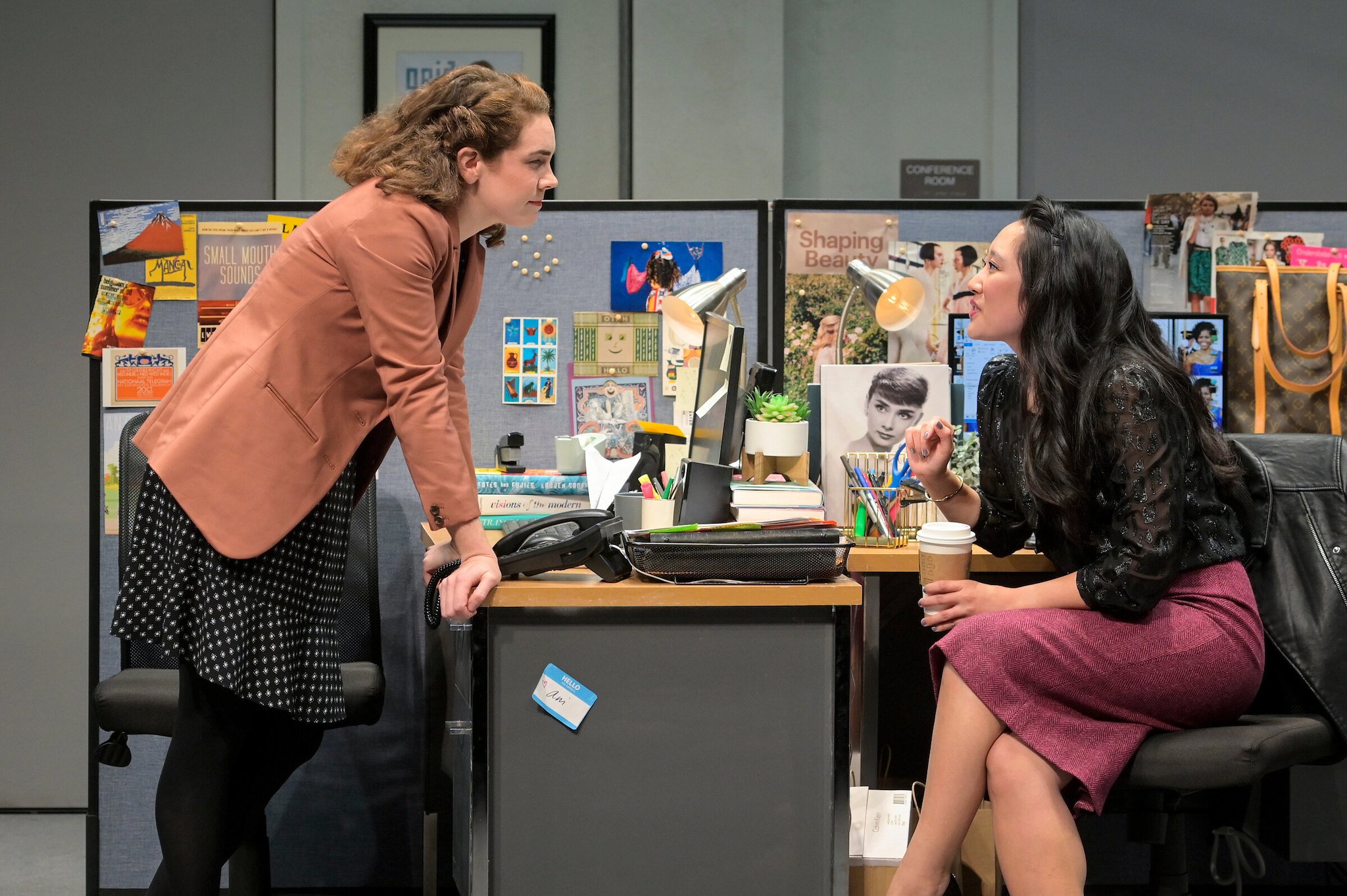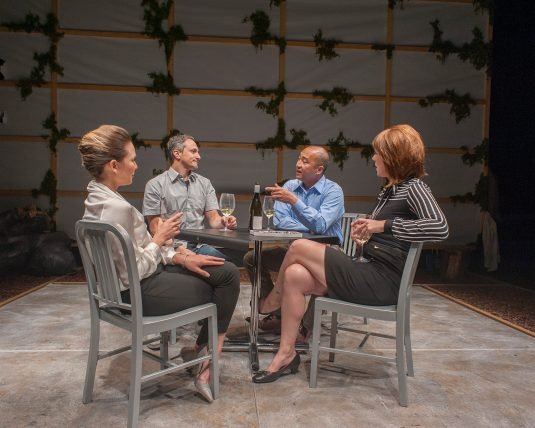
Tension is high in Aurora's audio drama The Flats
Sitting in the intimate Aurora Theatre watching great actors close up is one of the great treats of Bay Area theater. Even though we can't be together in that space for a while, the Aurora crew is still storytelling in its inimitably intimate way: with a world-premiere audio play by three Bay Area writers.

G-L-O-R-I-A! Gloria fascinates, frightens at ACT
Branden Jacobs-Jenkins' Gloria is a fascinating play. It's a lively workplace comedy until it's an unsettling workplace drama. There's a sheen of satire to it but also reality and heart. There's a bracing boldness to it that makes its two hours fly by, and its path is never exactly what you think it will be.

Delight and loss dance through Magic's Waltz revival
Any of us would be lucky – beyond lucky – to be as loved as Paula Vogel's brother Carl. The Pulitzer Prize-winning playwright (who, after nearly 50 years as one of the country's preeminent playwrights, will see her first Broadway opening next month with Indecent) wrote The Baltimore Waltz a year after Carl died of complications from AIDS. This is her tribute to him, a love letter from sister to brother, but she accomplishes this with such offbeat originality, whimsy and heart that there's no room for sentimentality or feeble clichés about love and loss.
Celebrating its 50th anniversary, Magic Theatre has revived The Baltimore Waltz 25 years after hosting its West Coast premiere.
Sisters count in SF Playhouse's 1 2 3
The three daughters of domestic terrorists – activists, as the eldest girl insists on calling them – have moved so often and changed their names so many times they can't really remember who they are exactly. The easiest thing to do is simply number themselves. 1 will be the eldest. 2 will be the middle child and 3 will be the baby.
When we meet these three smart, malleable children, in the world premiere of Lila Rose Kaplan's 1 2 3, they are in a new town about to head to a new school. Again.
Cal Shakes ends season with a vibrant Dream
A Midsummer Night's Dream is a landmark play for California Shakespeare Theater. When the company really became the company, then known as Berkeley Shakespeare Company, the first show produced at John Hinkel Park was Midsummer. Since then, the play has been performed seven more times, and now Cal Shakes concludes its 40th anniversary season with a version of the play that feels unlike any other production of it I've seen.
Writers' souls crushed, hilarity ensues in Rebeck's Seminar
The ego, the insecurity and the courage of fiction writers are all on hilarious and intriguing display in Theresa Rebeck's Seminar, a one-act comedy that derives laughter from pain and theatrical pleasure from whiplash-smart word play.
The premise is simple: four New York writers have paid $5,000 each for 10 weekly classes with a famous writer. They meet in the beautiful (and rent controlled) apartment of one classmate and wait anxiously for the globe-trotting famous guy, who can't really be bothered to remember their names, to pass judgement on their work.
Fifty shades of Wonder in Marin Theatre Co.'s Lasso
You're bound to like Carson Kreitzer's Lasso of Truth if you like Wonder Woman...and a heaping helping of S&M on the side.
If you didn't know the two were related, first of all, think about it for a minute (the golden lasso, the bustier, the metal bracelets, etc.), and second of all, has Kreitzer got an origin story for you. Commissioned by Marin Theatre Company, the play is part of the National New Play Network, which means this is what they call a "rolling world premiere." The show begins in Mill Valley then heads to Atlanta and Kansas City.
So where did Wonder Woman come from (and we're not talking about Paradise Island, home of the Amazons)? For many of us, she sprung fully formed in the 1970s looking like Lynda Carter in a patriotic bathings suit and gold accessories. That famous TV show is actually a jumping-off point for Kreitzer's play.
At SF Playhouse, pretty is as Pretty does
I've come to learn that when a Neil LaBute play or movie crosses my path, I detour around it, ignore it or make an immediate donation to a women's support or LBGT organization. LaBute is a really good writer – his ear for dialogue is impeccable, and his ferocity for storytelling is admirable. I just rarely like what his characters have to say or where his stories end up.
That said, LaBute's Reasons to Be Pretty, now at San Francisco Playhouse, marks the first time I've left one of the writer's play and not wanted to bash my head against the wall on the way out. Sure, there are traces of misogyny, homophobia and racism (mostly coming from the mouth of one classic LaButian male character). But what's interesting here is that LaBute is being provocative in the name of evolution, of self-actualization, of emotional growth.
Playwright Jordan Puckett ready for prime time
We have a Theater Dogs guest writer! Welcome Scott Lucas of San Francisco magazine, who chatted with playwright Jordan Puckett, whose Inevitable runs through March 23rd as part of San Francisco Playhouse’s Sandbox series.Scott Lucas: With the opening of Inevitable, it’s not only the first performance of this play, but the first time any of your plays has been done, right?Jordan Puckett: I’ve had readings of Inevitable before, though it’s had many titles and versions. This is the world premiere. It’s the first production of it, and my first production ever.
Bewitched? No, bothered and bewildered at SF Playhouse
Oh, how I would love to tell you how a graceful and convincing performance by Lauren English and a sturdy production by Bill English rescues John Van Druten's 1950 comedy Bell, Book and Candle from the heap of mediocre mid-century plays that have become irretrievably dated. And while Team English is indeed in good form here, the play itself is an attempt at enchantment that fails to enchant.
It very well could be that this play has been forever ruined for me by the TV show "Bewitched," which for eight seasons never failed to delight me as a witch made a family with a mortal man in a world with a closed collective mind where issues of magic were concerned. The TV show, which was inspired by Van Druten's play as well as the 1942 movie I Married a Witch, featured a blithe central performance by the ever-enchanting Elizabeth Montgomery, who somehow seemed above all the slapstick mayhem surrounding her. Members of the magic world were played for big laughs, none more so that Agnes Moorehead's delicious Endora, the mother-in-law from character actress hell (or heaven, depending on your point of view).
Dating sharp, funny, creepy Becky Shaw at SF Playhouse
The humor is in direct proportion to the discomfort in Gina Gionfriddo's Becky Shaw, now in its West Coast premiere at SF Playouse.
If David Mamet were good at anything other than provocation and crisp dialogue, he might write something as entertaining and as distressing as Becky Shaw, a smart, incisive and very funny play that, despite its lack of focus, makes for a beguiling evening of theater.
By lack of focus I mean that Gionfriddo doesn't delineate protagonist or antagonist. Even though the title of the play belongs to one character, the playwright's aim seems much broader – like how power works between family members, between men and women and between the seemingly weak and the seemingly strong. She's interested in highly functional dysfunctional people, which is to say, just about everybody.
Magic sends tingles through Chafee’s Body
"Once you start to ask," Eleanor says, "there are more questions than answers." Not a surprising statement in a play whose title, Why We Have a Body promises an answer to an implied question. And as Eleanor warns us, once those questions start forming, the answers, they keep multiplying.
Claire Chafee's wonderfully enigmatic play is back at the Magic Theatre to open its 45th anniversary season with a look backward before heading into a season of newer plays. Body is being called a "legacy revival" because it was a huge hit for the Magic in 1993, running for six months and winning a passel of awards. What a welcome return it is.
In the nearly two decades since the play's premiere, it has lost nothing in its sense of humor, sense of mystery and sense of, well, sensuality.
Chafee's is an intellectual world – people living in their heads, in their pasts (the phrase "when I was a child" crops up a lot), in a perpetual state of perplexity – but that world is sliced through by a sharp comedy derived from family fractures and psychological scars.